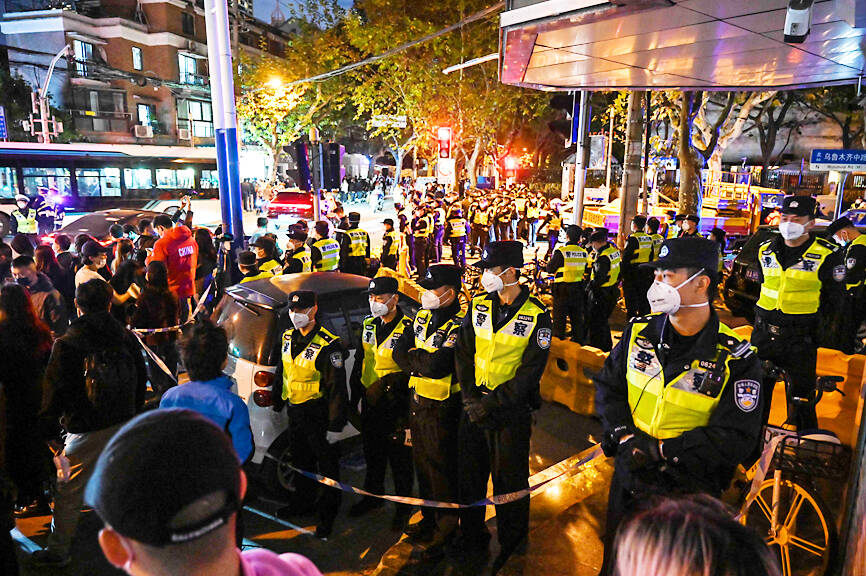A year after historic protests broke out on Shanghai’s bustling Wulumuqi Road, only a subtly increased police presence on main junctions betrays anything out of the ordinary, but for many involved in what became China’s most widespread demonstrations in decades, it’s impossible to erase the memory of the events of last autumn.
In the early hours of Nov. 27 last year, vigils for victims of a fire in Xinjiang’s capital, Urumqi, morphed into multi-city calls to end China’s “zero COVID” measures, and even in some cases topple the ruling Chinese Communist Party and President Xi Jinping (習近平).
Authorities responded by cracking down, but in early December last year they abruptly lifted the strict health restrictions that had dominated people’s lives for almost three years.

Photo: AFP
“Shortly after zero Covid lifted, everyone just got back to their normal daily life. Everyone just seems to have moved on, no one’s talking about it,” said Li, a protester in her 20s whose name has been changed for safety reasons.
For people such as Li, there is another reason for the silence: Police visited her last month and warned her not to demonstrate.
“When I think about [what happened last year] I still feel I’m suffocated by it,” Li said.
Like many, she believed harsh COVID-19 rules had hampered rescue efforts when she joined the vigil on Wulumuqi Road to grieve the 10 people killed in the fire.
Wulumuqi is the Mandarin name for the city of Urumqi.
“When I saw so many people on that street, although I was mourning, in another way I felt safe,” she said, recalling the first night of the protests.
“The atmosphere was sad, but also empowering,” she added.
Protests continued in Shanghai the next day, and ignited in other major cities, including Beijing, Guangzhou and Chengdu, with protesters holding aloft blank sheets of A4 paper to symbolize China’s lack of free speech.
“It was not surprising that protests would break out in response to the anti-COVID lockdowns,” Diana Fu, an associate professor of political science at the University of Toronto, adding that “bread-and-butter issues” are common flashpoints in China.
“What was surprising was the blunt anti-regime rhetoric,” she said.
Overt political protest is rare in China, a sophisticated surveillance state that punishes dissent harshly.
Li said she had been concerned about freedom of expression before, but “thought I could live with it, because it didn’t affect my everyday life.”
COVID-19 changed everything — especially after being “trapped ... like a prisoner” in the two-month Shanghai lockdown, she said.
“People are only going to protest for their rights when it affects them. That’s why there were so many people,” she said.
Huang Yicheng, a 27-year-old who was briefly detained on Wulumuqi Road and fled to Germany, said those who wanted more had “shouldered a lot of pressure to change the policy of the country.”
“The social movement tide was very big — but we were stranded like fish on a sand beach” when people went back to normal after “zero COVID” ended, he said.
China’s security apparatus sprang into action to quash the nascent movement, from scrubbing all online mention of the protests to blanketing cities with officers.
On the second night of protests in Shanghai, Li said, police were more prepared to use force.
“They were dragging a girl into a police car — it was so violent,” she said.
Huang said he was dragged upside down along the pavement, losing his glasses and shoes. In the chaos, during which he said he saw numerous women being beaten, he managed to escape without his name being taken.
Li was called to a police station a week later, and confronted with a picture of herself at the protest. “They asked me to describe what I did and why I was there ... in a lot of detail,” she said.
William Nee (倪偉平), coordinator for research and advocacy at non-governmental organization Chinese Human Rights Defenders, said he estimated more than 100 people had been taken in or detained across the country after the protests.
He said he believed most had now been released, except for 19-year-old Uighur student Kamile Wayit.
Human Rights Watch recently called for her release, along with that of Peng Lifa (彭立發), who in October last year unfurled an anti-government banner across a Beijing bridge.
The Chinese Ministry of State Security did not respond t queries about the protests, including about those still detained.
Huang said he would not return to China until he considers it safe.
For those who have spoken out, he said: “We can never go back to normal as before.”

With much pomp and circumstance, Cairo is today to inaugurate the long-awaited Grand Egyptian Museum (GEM), widely presented as the crowning jewel on authorities’ efforts to overhaul the country’s vital tourism industry. With a panoramic view of the Giza pyramids plateau, the museum houses thousands of artifacts spanning more than 5,000 years of Egyptian antiquity at a whopping cost of more than US$1 billion. More than two decades in the making, the ultra-modern museum anticipates 5 million visitors annually, with never-before-seen relics on display. In the run-up to the grand opening, Egyptian media and official statements have hailed the “historic moment,” describing the

SECRETIVE SECT: Tetsuya Yamagami was said to have held a grudge against the Unification Church for bankrupting his family after his mother donated about ¥100m The gunman accused of killing former Japanese prime minister Shinzo Abe yesterday pleaded guilty, three years after the assassination in broad daylight shocked the world. The slaying forced a reckoning in a nation with little experience of gun violence, and ignited scrutiny of alleged ties between prominent conservative lawmakers and a secretive sect, the Unification Church. “Everything is true,” Tetsuya Yamagami said at a court in the western city of Nara, admitting to murdering the nation’s longest-serving leader in July 2022. The 45-year-old was led into the room by four security officials. When the judge asked him to state his name, Yamagami, who

DEADLY PREDATORS: In New South Wales, smart drumlines — anchored buoys with baited hooks — send an alert when a shark bites, allowing the sharks to be tagged High above Sydney’s beaches, drones seek one of the world’s deadliest predators, scanning for the flick of a tail, the swish of a fin or a shadow slipping through the swell. Australia’s oceans are teeming with sharks, with great whites topping the list of species that might fatally chomp a human. Undeterred, Australians flock to the sea in huge numbers — with a survey last year showing that nearly two-thirds of the population made a total of 650 million coastal visits in a single year. Many beach lovers accept the risks. When a shark killed surfer Mercury Psillakis off a northern Sydney beach last

‘CHILD PORNOGRAPHY’: The doll on Shein’s Web site measure about 80cm in height, and it was holding a teddy bear in a photo published by a daily newspaper France’s anti-fraud unit on Saturday said it had reported Asian e-commerce giant Shein (希音) for selling what it described as “sex dolls with a childlike appearance.” The French Directorate General for Competition, Consumer Affairs and Fraud Control (DGCCRF) said in a statement that the “description and categorization” of the items on Shein’s Web site “make it difficult to doubt the child pornography nature of the content.” Shortly after the statement, Shein announced that the dolls in question had been withdrawn from its platform and that it had launched an internal inquiry. On its Web site, Le Parisien daily published a